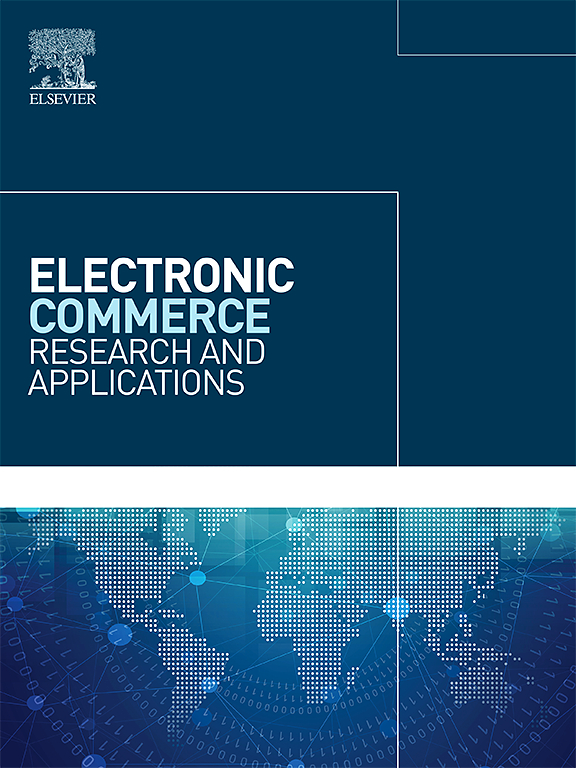A comparative study of various recommendation algorithms based on E-commerce big data
IF 5.9
3区 管理学
Q1 BUSINESS
Electronic Commerce Research and Applications
Pub Date : 2024-11-01
DOI:10.1016/j.elerap.2024.101461
引用次数: 0
Abstract
With the rapid development of the Internet and the concomitant exponential growth of information, we have entered an era characterized by information overload. The abundance of data has rendered it increasingly arduous for users to pinpoint specific information they require. However, various forms of recommendation algorithms proffer solutions to this challenge. These algorithms predict items or products that may pique users’ interest based on their historical behavior, preferences, and interests. As one of the current hot research fields, recommendation algorithms are extensively employed across E-commerce platforms, movie streaming services, and various other contexts to cater to the diverse needs of users. In this context, a multi-recommendation algorithms comparison platform is proposed, which includes a two-fold model: online evaluation and offline evaluation. Taking the data set of the Chinese Amazon online shopping mall as the experimental data, item-based collaborative filtering (Item-CF) algorithm, content-based (TF-IDF) algorithm, item2vec model, alternating least squares (ALS) algorithm and neural network algorithm are evaluated in the offline model. In the real-time recommendation part, model-based algorithm is used to achieve the users’ rating mechanism. And the metrics used for evaluation include: precision, recall, accuracy and performance. The experimental results show that the average performance of hybrid algorithms such as ALS algorithm and neural network algorithm is higher than that of other traditional algorithms, and the real-time recommendation system achieves the purpose of improving recommendation speed. By integrating various recommender algorithms into the multi-recommendation algorithms comparison platform, this platform automatically computes and presents various performance indicators based on the user-provided dataset. It aids E-commerce platforms in making informed decisions regarding algorithm selection.
基于电子商务大数据的各种推荐算法比较研究
随着互联网的飞速发展和随之而来的信息指数级增长,我们已经进入了一个以信息超载为特征的时代。大量的数据使用户越来越难以确定他们需要的特定信息。然而,各种形式的推荐算法为这一挑战提供了解决方案。这些算法根据用户的历史行为、偏好和兴趣来预测可能会引起他们兴趣的项目或产品。作为当前的热门研究领域之一,推荐算法被广泛应用于电子商务平台、电影流媒体服务和其他各种场合,以满足用户的不同需求。在此背景下,本文提出了一个多推荐算法比较平台,包括在线评价和离线评价两个方面的模型。以中国亚马逊网上商城的数据集为实验数据,在离线模型中对基于项目的协同过滤(Item-CF)算法、基于内容的(TF-IDF)算法、item2vec 模型、交替最小二乘法(ALS)算法和神经网络算法进行了评估。在实时推荐部分,使用基于模型的算法来实现用户评级机制。评估指标包括:精确度、召回率、准确率和性能。实验结果表明,ALS 算法和神经网络算法等混合算法的平均性能高于其他传统算法,实时推荐系统达到了提高推荐速度的目的。该平台将多种推荐算法集成到多推荐算法比较平台中,根据用户提供的数据集自动计算并呈现各种性能指标。它有助于电子商务平台在算法选择方面做出明智的决策。
本文章由计算机程序翻译,如有差异,请以英文原文为准。
求助全文
约1分钟内获得全文
求助全文
来源期刊

Electronic Commerce Research and Applications
工程技术-计算机:跨学科应用
CiteScore
10.10
自引率
8.30%
发文量
97
审稿时长
63 days
期刊介绍:
Electronic Commerce Research and Applications aims to create and disseminate enduring knowledge for the fast-changing e-commerce environment. A major dilemma in e-commerce research is how to achieve a balance between the currency and the life span of knowledge.
Electronic Commerce Research and Applications will contribute to the establishment of a research community to create the knowledge, technology, theory, and applications for the development of electronic commerce. This is targeted at the intersection of technological potential and business aims.
 求助内容:
求助内容: 应助结果提醒方式:
应助结果提醒方式:


